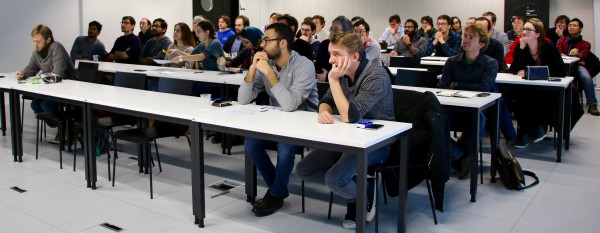MARVEL Junior Seminar — October 2019
The MARVEL Junior Seminars aim to intensify interactions between the MARVEL Junior scientists belonging to different research groups located at EPFL. The EPFL community interested in MARVEL research topics is very welcome to attend. We believe that these events will be central for establishing a vibrant community.
Each seminar consists of two presentations of 25 minutes each, allowing to present on a scientific question in depth, followed by time for discussion. The discussion is facilitated and timed by the chair.
Pizza is served at 11:45 in the MED hall (floor 0), and after the seminar at 13:30 you are cordially invited for coffee and dessert to continue discussion with the speakers.

MARVEL Junior Seminar Organizing Committee — Giuliana Materzanini, Stefano Falletta, Olga Syzgantseva, Maria Fumanal, Markus Stricker, Kristians Cernevics and Patrick Mayor
Abstract — Energy-based Descriptors for Photo-Catalytically Active Metal-Organic Frameworks Discovery
Maria Fumanal1,2,3, Gloria Capano1, Senja Barthel1, Berend Smit1, Ivano Tavernelli3
1 Laboratory of Molecular Simulation (LSMO), EPFL
2 Computational Molecular Design Laboratory (LCMD), EPFL
3 IBM Research Zurich
The use of metal-organic frameworks (MOFs) as photocatalysts has recently emerged as a promising alternative in the field of energy-related applications. Their inherent structural flexibility and tunability allow a target-oriented design for which appropriate descriptors must be considered. We propose a systematic computational protocol to determine two energy-based descriptors directly related with the potential of MOFs to be used as photocatalysts. Those descriptors assess the UV-vis light absorption capability and the band energy alignment with respect to redox processes and/or co-catalysts energy levels. High-throughput screening based on accurate computations of these features is envisioned to aid in the discovery of new photoactive systems.
Abstract — Electronic transport workflow and high-throughput search for high-mobility 2D materials
Thibault Sohier1, Marco Gibertini1,2, Davide Campi1, Nicola Marzari1
1 Theory and Simulation of Materials (THEOS), EPFL
2 Department of Quantum Matter Physics, University of Geneva
Recently, some of us identified close to 2000 exfoliable 2D materials from first-principles calculations [1]. Among other quests, we are now seeking electrostatically-doped 2D semiconductors with superior intrinsic transport properties. We first developed an accurate and automated workflow to compute phonon-limited mobilities [2]. We identify the pockets of electrons relevant for transport and the phonons needed to describe all possible scattering events within. Electron-phonon interactions are computed with density functional perturbation theory using a truncated Coulomb interaction in the non-periodic direction and gates to induce doping [3]. This complete picture of electron-phonon scattering reveals consistently strong intervalley scatterings and the subtle impact of doping on electron-phonon interactions [4]. The mobility is obtained by solving the Boltzmann transport equation iteratively. The "triangles" integration method is used for the delta functions associated to energy conservation. Computing the mobility of all 2000 materials in the database is impractical. Instead, we learn from the in-depth study of a diverse selection of materials to unravel the essence of a high mobility 2D material. We then translate our observations into computationally affordable and quantifiable descriptors to identify the best candidates in our database.
[1] N. Mounet et al., Nature Nanotechnol. 13 246 (2018)
[2] T. Sohier, D. Campi, N. Marzari, M. Gibertini, Phys. Rev. Materials 2 114010 (2018)
[3] T. Sohier, M. Calandra, and F. Mauri, Phys. Rev. B 96 075448 (2017)
[4] T. Sohier, E. Ponomarev, M. Gibertini, H. Berger, N. Marzari, N. Ubrig, and A. Morpurgo, Phys. Rev. X 9 031019 (2019).
Check the list of the next MARVEL Junior Seminars here.
Low-volume newsletters, targeted to the scientific and industrial communities.
Subscribe to our newsletter